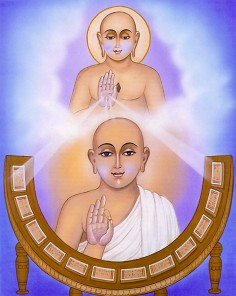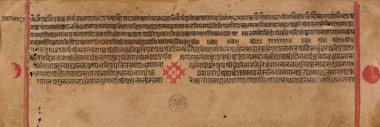Fifth Lecture: Death Against One’s Will
In this ocean (of life) with its currents (viz. births) difficult to cross, one man has reached the opposite shore; one wise man has given an answer to the following question. (1)
These two ways of life ending with death have been declared: death with one’s will, and death against one’s will. (2)
Death against one’s will is that of ignorant men, and it happens (to the same individual) many times. Death with one’s will is that of wise men, and at best[1] it happens but once. (3)
Mahāvīra has (thus) described the first kind in which an ignorant man, being attached to pleasures, does very cruel actions. (4)
A man attached to pleasures and amusements will be caught in the trap (of deceit). (He thinks): “I never saw the next world, but I have seen with my own eyes the pleasures of this life.” (5)
“The pleasures of this life are (as it were) in your hand, but the future ones are uncertain.[2] Who knows whether there is a next world or not?” (6)
The fool boasts: “I shall have the company of (most) men.”[3] But by his love of pleasures and amusements he will come to grief. (7)
Then he begins to act cruelly against movable and immovable beings, and he kills living beings with a purpose or without. (8)
An ignorant man kills, lies, deceives, calumniates, dissembles, drinks liquor, and eats meat, thinking that this is the right thing to do. (9)
Overbearing in acts and words, desirous for wealth and women, he accumulates sins in two ways,[4] just as a young snake gathers dust (both on and in its body). (10)
Then he suffers ill and is attacked by disease; and he is in dread of the next world when he reflects on his deeds. (11)
I have heard of the places in hell, and of the destination of the sinner, where the fools who do cruel deeds will suffer violently. (12)
Then going to the place where he is to be born again according to his deeds, he feels remorse, as I have heard (from my teacher). (13)
As a charioteer, who against his better judgment leaves the smooth highway and gets on a rugged road, repents when the axle breaks; so the fool, who transgresses the Law and embraces unrighteousness, repents in the hour of death, like (the charioteer) over the broken axle. (14, 15)
Then when death comes at last, the fool trembles in fear; he dies the “death against one’s will,” (having lost his chance) like a gambler vanquished by Kali. (16)
Thus has been explained the fools’ “death against one’s will”; now hear from me the wise men’s “death with one’s will!” (17)
Full of peace and without injury to any one is, as I have heard (from my teachers), the death of the virtuous who control themselves and subdue their senses.[5](18)
(Such a death) does not fall to the lot of every monk, nor of every householder; for the morality of householders is of various character, and that of monks is not always good throughout. (19)
Some householders are superior to some monks in self-control; but the saints are superior to all householders in self-control. (20)
Bark and skin (of a goat), nakedness, twisted hair, baldness—these (outward tokens) will not save a sinful ascetic. (21)
A sinner, though he be a mendicant (friar), will not escape hell; but a pious man, whether monk or householder, ascends to heaven. (22)
A faithful man should practise[6] the rules of conduct for householders; he should never neglect the Pōsaha fast[7] in both fortnights, not even for a single night. (23)
When under such discipline he lives piously even as a householder, he will, on quitting flesh and bones,[8] share the world of the Yakṣas. (24)
Now a restrained monk will become one of the two: either one free from all misery or a god of great power. (25)
To the highest regions, in due order, to those where there is no delusion, and to those which are full of light, where the glorious (gods dwell)—who have long life, great power, great lustre, who can change their shape at will, who are beautiful as on their first day, and have the brilliancy of many suns—to such places go those who are trained in self-control and penance, monks or householders, who have obtained liberation by absence of passion. (26-28)
Having heard (this) from the venerable men who control themselves and subdue their senses, the virtuous and the learned do not tremble in the hour of death. (29)
A wise man having weighed (both kinds of death) and chosen the better one (taught in) the Law of Compassion, will become calm through patience, with an undisturbed mind (at the time of death). (30)
When the right time (to prepare for death) has arrived, a faithful (monk) should in the presence (of his teacher) suppress all emotions (of fear or joy) and wait for the dissolution of his body. (31)
When the time for quitting the body has come, a sage dies the “death with one’s will,” according to one of the three methods.[9] (32)
Thus I say.
 Ganadhar Sudharma Swami
Ganadhar Sudharma Swami
